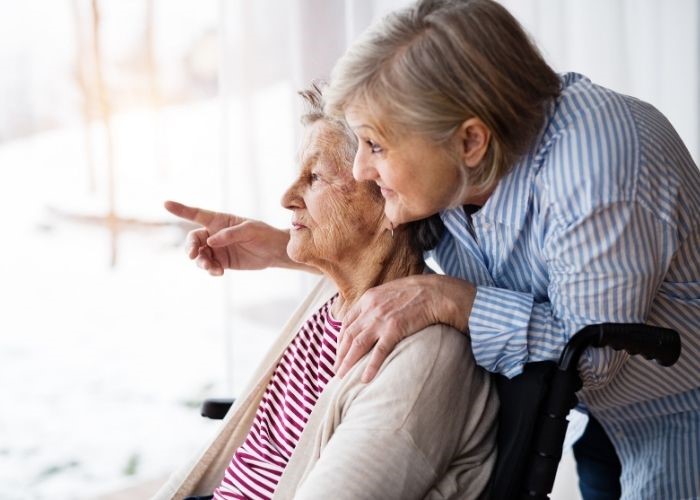How do we get recognized as essential?
I first wrote about essential caregivers in a collaborative article with Laurie Facciarossa Brewer, NJ Long Term Care Ombudsman: Pandemic Tipping Point: Allowing Family Members Into LTC Facilities.
In response to the physical and mental decline of residents in long term care facilities, several states. NJ included, created a new category of visitor called ”essential caregiver”. Unfortunately, the term was associated with tasks like personal grooming, organizing clothes, cleaning out the refrigerator or getting residents to eat.
A definition that binds caregivers to only those tasks defined as Activities of Daily Living (ADL) or Instrumental Activities of Daily Living (IADL) is a mistake. This focus on using tasks to define essential care does not consider the need to offset boredom, loneliness and lack of socialization, all of which are required to “sustain and nourish” your soul. In my opinion, these are more important than clean clothes.
There has never been a more opportune time to legitimize family caregivers and recognize them for the essential work they carry out. It starts with a title and unfortunately, I don’t think it can be “family caregiver”. For too long the term “family” has been synonymous with women’s work. The sad truth is women’s work, especially for women of color, is simply not valued in our society, despite the work of Ai-jen Pooand the National Domestic Workers Alliance to change that dynamic. Nor does this misperception do justice to the number of male family caregivers and the number of children from middle school on up that are family caregivers.
Personally, I like the title essential caregiver. But whatever the title, this designation must be recognized by the government and business for the critical work performed, work that is a critical linchpin in our economy. Recognition is the foundation for getting paid, for training in new skills and a place at the table when our loved one is hospitalized, living in a skilled nursing home, assisted living or rehabilitation facility.
There is movement towards recognizing the importance of essential caregivers on a national level and in states through listening sessions. It is important that we contact our representatives so our voices are heard.
National
- The American Rescue Plan Act, Section 9817 offers a 10% enhanced FMAP rate to states that enhance, expand or strengthen home and community-based services. This includes help for those who care for a family member. Recommendations can be found here: https://www.careyearsacademy.com/funding/
- The National Jobs Plan (President Biden’s infrastructure bill) broadens our traditional definition of “infrastructure” to include a provision for in-home care. The plan is to spend $400B over 15 years to expand access to caregiving for those who are older and those with disabilities. In addition, it intends to get to the root of the problem to improve pay and benefits for caregivers.
Chiquita Brooks-LaSure has been confirmed as the Administrator of the Centers for Medicare & Medicaid Services (CMS). For me, it is one of the most important positions in any administration since CMS regulates nursing homes and oversees $1 trillion in funding. In addition, Ms. Brooks-LaSure oversees the Affordable Care Act, making telehealth flexibility permanent and improving dual-eligible care. I am interested to understand how changes to Medicare’s current funding could increase services and stop so many people from falling through the cracks.
As we work towards legislation that recognizes and supports caregivers, let’s also work towards a definition of essential caregivers that recognizes their contribution with pay. Creating a set of standards for what pay is based on should start with what we require of Certified Nursing Assistants (CNA) and Home Health Aides (HHA). It starts by equating current on-the-job experience to current certification requirements and then altering or waiving some of the training as needed. We have been doing it for teachers for years. Why can’t we do it for caregivers as well?
Once certification is in place, it can become the norm for home care agencies to hire family members as the essential caregiver. It would help with the current problem of not having enough workers to hire for all the home care requests. Since an agency can take over the administrative task of withholding taxes, a huge burden for family members on top of caregiving, while getting an administrative fee, it is a win-win in my book.
If this certification had been in place before the pandemic, we would not have so many family members barred from seeing their loved ones in skilled nursing, assisted living and rehab facilities.
I understand this issue is complicated. I understand these suggestions will not solve everyone’s concerns. But the time is NOW to have these discussions and make sure your voice is heard.
What would you like to see change?
What would help you?
What would you suggest as an alternative title to essential caregiver?
If you are interested in certification programs for caregivers, you can start with the Certified Family Care Manager Pilot Program. The next program will be scheduled for late summer early fall. To learn mover about it: Certified Family Care Manager Pilot Program.
Disclaimer: The material in this blog is for educational purposes only. It is not intended to replace, nor does it replace, consulting with a physician, lawyer, accountant, financial planner or other qualified professional.
Deb is available as a caregiver consultant. She will answer the question: “Where do I start?” and find the resources to alleviate your stress. If you would like to invest a half hour to learn how she can help you, please contact her at: Free 30 minute consulting call
Deb is the author of “Your Caregiver Relationship Contract.” This book explains how to have an intentional conversation and the how unspoken expectations can cause problems. Click here to learn more about Your Caregiver Relationship Contract.

